Wealth
of notions
>> Finally,
22 economists whose ideas have at least one point in common: they
all won the Nobel Prize. Here, in translation, are the theories
that made Chicago famous.
THE
CHICAGO MACHINE
At
last we reach dead center: nine faculty members recognized immediately
and completely as Chicago economists.
On
the bicentennial anniversary of the publication of Adam Smith's
The Wealth of Nations, Milton
Friedman, AM'33, became a 1976 laureate "for his
achievements in the fields of consumption analysis, monetary history
and theory and for his demonstration of the complexity of stabilization
policy." From Capitalism and Freedom (1962) to Free
to Choose (with his wife, Rose Director Friedman, PhB'32,
1980), Friedman has been an indefatigable debater and defender
of market capitalism and individual freedoms. But the award was
for his contributions to macroeconomic thought, theory, and policy.
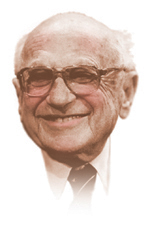 In
A Theory of the Consumption Function (1957) and A Monetary
History of the United States (with Anna J. Schwartz, 1963),
Friedman established himself as a principal critic of Keynesian
economics and the leader of the Monetarist revival-a belief that
fluctuations in the supply of money are the principal cause of
business cycles and inflation. He views economic fluctuations
and instabilities as monetary phenomena that generally originate
in Washington, D.C., and his macroeconomic policy recommendations
are few and simple: the federal government and the Federal Reserve
System should not attempt to fine-tune the economy with changes
in spending, taxes, or interest rates; rather, directors at the
Fed should expand the money supply at a known, steady rate (4
percent annually) and then head to the tennis courts.
In
A Theory of the Consumption Function (1957) and A Monetary
History of the United States (with Anna J. Schwartz, 1963),
Friedman established himself as a principal critic of Keynesian
economics and the leader of the Monetarist revival-a belief that
fluctuations in the supply of money are the principal cause of
business cycles and inflation. He views economic fluctuations
and instabilities as monetary phenomena that generally originate
in Washington, D.C., and his macroeconomic policy recommendations
are few and simple: the federal government and the Federal Reserve
System should not attempt to fine-tune the economy with changes
in spending, taxes, or interest rates; rather, directors at the
Fed should expand the money supply at a known, steady rate (4
percent annually) and then head to the tennis courts.
In
Friedman's view, given policy lags and political overlays, proposals
to stimulate a sluggish economy through more spending and tax
cuts, such as those the Bush administration and Congressional
Democrats have proposed, or continued intervention by the Fed
in credit markets, are likely to harm-not help-the economy. He
ardently opposes the view that there is any long-term tradeoff
between inflation and unemployment that policy makers can influence
through their incessant tinkering. In short, his Nobel came for
recognizing the complexity (and Friedman would add, the futility)
of stabilization policy.
Theodore
W. Schultz (1902-98), who taught at Chicago for more
than 50 years, shared the 1979 award with Sir Arthur Lewis for
"pioneering research into economic development research with
particular consideration of the problems of developing countries."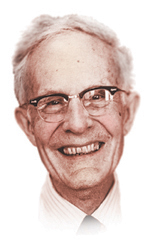
Schultz's
initial interest was in U.S. agriculture, a base from which he
shifted first to agricultural productivity and economic growth
and then to economic development. Never straying far intellectually
or emotionally from his rural Midwest heritage, Schultz had enormous
faith in farmers' commonsense responses to incentives in their
choices of production techniques and resource allocations, a belief
that figured prominently in his criticisms of public-policy interventions
and recommendations when it came to alleviating poverty in underdeveloped
nations.
Not
cited explicitly, though integral to his research on economic
development, was Schultz's other extraordinary contribution to
economics: his work on human capital (the knowledge and skills
acquired through formal education and on-the-job training). In
addition to his own work linking theory with data, Schultz was
a tireless mentor for colleagues and students and was the intellectual
inspiration for what has come to be known as "the new home
economics," Chicago-style research devoted to the study of
family decision making with regard to fertility, marriage, and
education.
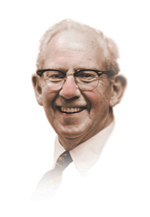 George
J. Stigler, PhD'38 (1911 -91), received the 1982 prize
for "seminal studies of industrial structures, functioning
of markets and causes and effects of public regulation."
The study of market processes and industry structure is called
Industrial Organization, and Stigler's applied, empirical orientation
improved understanding of the entire spectrum from pure competition
to monopoly, including the behavior of prices and the scale of
operations. He favored a minimalist antitrust policy, preferring
competition (and potential competition-the threat of new entrants
into an area or industry-later termed "contestable markets")
to reduce firms' ability to charge excessive prices or to control
the supply of a good or service.
George
J. Stigler, PhD'38 (1911 -91), received the 1982 prize
for "seminal studies of industrial structures, functioning
of markets and causes and effects of public regulation."
The study of market processes and industry structure is called
Industrial Organization, and Stigler's applied, empirical orientation
improved understanding of the entire spectrum from pure competition
to monopoly, including the behavior of prices and the scale of
operations. He favored a minimalist antitrust policy, preferring
competition (and potential competition-the threat of new entrants
into an area or industry-later termed "contestable markets")
to reduce firms' ability to charge excessive prices or to control
the supply of a good or service.
When
it came to government regulation of industry, Stigler was a skeptic
who argued convincingly that: (a) regulation often occurs because
of producers' interests-the desire to be protected from market
forces and to be under the apparent thumb of a regulatory agency
they could co-opt (his "capture theory" of regulation)-not
consumers' interests; and (b) whether in housing, utilities, or
labor markets, regulation is unlikely to result in discernible
consumer or worker benefits. (Were he alive today, he would oppose
the bailout of the airline industry and the shift of airport security
from the private to public sector.)
Though
not noted in his Nobel citation, Stigler founded the economics
of information; he introduced the costs of acquiring information-whether
it be for sellers and buyers of products or employers and employees
in a labor market-explicitly in his models and analyses of prices
and wages. Work by other laureates (including Simon in 1978, Mirrlees
and Vickrey in 1996, and Akerlof, Spence, and Stiglitz in 2001)
on information, including asymmetric information problems, can
be traced to Stigler's work.
The
1990 prize was awarded jointly to GSB faculty member and Scholes's
thesis adviser Merton
H. Miller (1923- 2000), Markowitz, and Sharpe for their
"work in the theory of financial economics," with Miller
specifically cited for "fundamental contributions to the
theory of corporate finance." In collaboration with 1985
laureate Franco Modigliani, Miller revolutionized corporate finance
theory and how firms think about financing both their operations
and their investments.
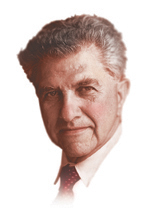 His
specific insight was that the costs of raising capital for a corporation
by selling more stock-equity-or issuing more bonds-debt-should
be equal, and thus a corporation's value in the stock market is
independent of its capital structure. He called this the "irrelevance
principle" and used a pizza analogy-for a given-size pizza
the number of pieces into which a pizza is sliced doesn't affect
the underlying amount of pizza one has-to drive home that point.
He later factored in complications such as how a nation's tax
structures and bankruptcy policies affect the relationship between
a firm's capital structure, dividend policies, and market value.
His
specific insight was that the costs of raising capital for a corporation
by selling more stock-equity-or issuing more bonds-debt-should
be equal, and thus a corporation's value in the stock market is
independent of its capital structure. He called this the "irrelevance
principle" and used a pizza analogy-for a given-size pizza
the number of pieces into which a pizza is sliced doesn't affect
the underlying amount of pizza one has-to drive home that point.
He later factored in complications such as how a nation's tax
structures and bankruptcy policies affect the relationship between
a firm's capital structure, dividend policies, and market value.
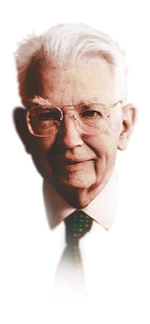 In
1991 Ronald
H. Coase became the first faculty ember in a law school
to earn the prize, for "his discovery and clarification of
the significance of transaction costs and property rights for
the institutional structure and functioning of the economy."
Coase made two important points: first, factors that determine
the size of firms (and why firms even exist in the first place),
and, second, conditions under which private voluntary arrangements,
without government intervention, can handle "externality"
or "third-party" problems associated with production
or consumption. Although not part of the Nobel citation, Coase's
20-year stewardship as editor of the Journal of Law and Economics
influenced research directions and practical applications in economics
and the legal world.
In
1991 Ronald
H. Coase became the first faculty ember in a law school
to earn the prize, for "his discovery and clarification of
the significance of transaction costs and property rights for
the institutional structure and functioning of the economy."
Coase made two important points: first, factors that determine
the size of firms (and why firms even exist in the first place),
and, second, conditions under which private voluntary arrangements,
without government intervention, can handle "externality"
or "third-party" problems associated with production
or consumption. Although not part of the Nobel citation, Coase's
20-year stewardship as editor of the Journal of Law and Economics
influenced research directions and practical applications in economics
and the legal world.
Coase's
1937 paper, "The Nature of the Firm," discussed how
firms, in pursuit of efficiency, decide to produce some things
on their own versus, in popular parlance, "outsourcing"
these tasks. For Coase, the key element was the "transactions
costs" associated with that choice. Today his work has new
implications for the size of firms and the degree of specialization
in an Internet world, where transaction costs become smaller and
smaller.
In
what may be the most often-cited article in both economics and
law, "The Problem of Social Cost" (1960), appeared the
proposition, now known as "The Coase Theorem," that
when transactions costs are small, the assignment of legal property
rights (say, between a factory that emits air or water pollution
and individuals affected by it) will have no impact on the allocation
of resources. Transacting parties-a cattle rancher and a farmer,
a polluter and downstream homeowners-can weigh costs and benefits
and then bargain privately to produce an efficient outcome. Thus
government intervention is not necessary to handle cases where
private and social costs may diverge.
In
what could be regarded as a veritable understatement, in 1992
the Academy awarded the Nobel prize in economics to Gary
S. Becker, AM'53, PhD'55, for "having extended
the domain of microeconomic analysis to a wide range of human
behavior and interaction, including non-market behavior."
A theme of Becker's work is that individuals and organizations
respond purposefully and predictably ("rational choice")
to a given set of constraints and incentives to achieve a given
objective, regardless of the type of activity under consideration.
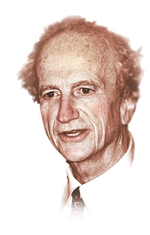 Beginning
with his dissertation on the economics of discrimination, Becker,
a professor in sociology as well as economics, has applied economic
theories to an array of social problems and aspects of human behavior.
This seeming encroachment on other social-science disciplines,
reflected best, perhaps, by the title of his 1997 collection of
Business Week columns, The Economics of Life, has
prompted some criticism that economics is attempting to become
the "imperial science." Becker's
intellectual breadth is demonstrated by his theoretical formulations
and empirical study of the economics of crime and punishment;
racial and gender discrimination; education and returns on investments
in human capital; the allocation of time; the family, household
production, and decision making with regard to marriage, divorce,
and fertility; and addiction. His post-Nobel research includes
work on how preferences and values are shaped (Accounting for
Tastes, 1996) and how the social environment influences choices
(Social Economics, with Chicago colleague Kevin M. Murphy,
2000).
Beginning
with his dissertation on the economics of discrimination, Becker,
a professor in sociology as well as economics, has applied economic
theories to an array of social problems and aspects of human behavior.
This seeming encroachment on other social-science disciplines,
reflected best, perhaps, by the title of his 1997 collection of
Business Week columns, The Economics of Life, has
prompted some criticism that economics is attempting to become
the "imperial science." Becker's
intellectual breadth is demonstrated by his theoretical formulations
and empirical study of the economics of crime and punishment;
racial and gender discrimination; education and returns on investments
in human capital; the allocation of time; the family, household
production, and decision making with regard to marriage, divorce,
and fertility; and addiction. His post-Nobel research includes
work on how preferences and values are shaped (Accounting for
Tastes, 1996) and how the social environment influences choices
(Social Economics, with Chicago colleague Kevin M. Murphy,
2000).
GSB
scholar Robert
W. Fogel and Douglass C. North were honored in 1993
"for having renewed research in economic history by applying
economic theory and quantitative methods in order to explain economic
and institutional change," recognizing their methodological
contributions to quantitative or econometric history-also referred
to as "Cliometrics" or "the new economic history."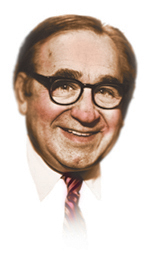
In
his dissertation, which appeared in book form as Railroads
and American Economic Growth (1964), Fogel used econometric
tools and compiled enormous historical data sets to test a counterfactual
("what if") proposition about the development of the
United States in the absence of railroads. He demonstrated that
waterways, canals, and roads could have handled transportation
needs adequately, and thus railroads were not vital to the nation's
development.
His
second controversial foray was in 1974 when he and Rochester economist
Stanley Engerman published Time on the Cross, an analysis
of slavery and the Southern economy, which they determined-on
economic, not humanitarian or ethical grounds-to be prosperous,
viable entities on the eve of the Civil War.
Fogel's
contributions in the last decade have been twofold: a large-scale
demographic study of nutrition and mortality, and an examination
of recurring long-term economic, political, and religious cycles
in the United States (The Fourth Great Awakening, 2000).
In addition, Fogel's doctoral students have contributed new studies
of labor history, monetary and financial history, the distribution
of wealth, demography, tariff legislation, and other public policies.
Robert
E. Lucas Jr., AB'59, PhD'64, became a laureate in 1995
for "having developed and applied the hypothesis of rational
expectations, and thereby having transformed macroeconomic analysis
and deepened our understanding of economic policy." Keynesian
economics assumes in part that changes in central government spending
or tax policies, or changes in the money supply or interest rates
by the central bank, can influence a nation's level of employment,
inflation, and economic growth. Not so, says Lucas.
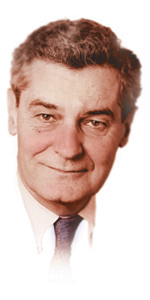 To
theextent that individuals and businesses can anticipate such
policy changes, they may well take steps (say, consuming less
and saving more if there is a tax cut because at some point in
the future the government will raise taxes to recoup its revenues)
that could offset this public action-the "policy-ineffectiveness"
theorem. Thus the term used by the Academy -rational expectations-to
characterize Lucas's contributions.
To
theextent that individuals and businesses can anticipate such
policy changes, they may well take steps (say, consuming less
and saving more if there is a tax cut because at some point in
the future the government will raise taxes to recoup its revenues)
that could offset this public action-the "policy-ineffectiveness"
theorem. Thus the term used by the Academy -rational expectations-to
characterize Lucas's contributions.
The
practical implication is that Lucas and other "new classical
economists" remain skeptical about the government's or the
Federal Reserve System's ability to fine-tune the economy in the
short run or to affect systematically long-term employment or
the rate of economic growth. The recommended macroeconomic policy
prescription in light of September 11 and the aftermath: Provide
a steady, stable framework through which financial and industrial
markets and individual households can respond most effectively.
In
the last few years Lucas has turned to a vexing and vital issue:
the widening income gap between rich and poor nations. In modeling
long-term economic growth, Lucas estimates that this disparity
will narrow considerably throughout the 21st century, bringing
more beneficiaries of economic growth and thus modifying Adam
Smith's title slightly to read The Wealth of All Nations.
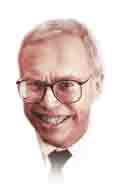 James
J. Heckman shared the 2000 prize with McFadden for
his "development of theory and methods for analyzing selective
samples," methodological insights Heckman brought to wide-ranging
individual and policy issues. For example, comparing subsequent
wages earned by those who enter and complete job training programs
to the wages earned by those who do not shows a respectable rate
of return to this investment in education. But that assumes the
two groups are identical, isolating the effect of a single variable:
the training program. Heckman demonstrated that there may be underlying
differences in motivation and/or self-discipline between the two
groups (or samples), and thus an inherent selection bias.
James
J. Heckman shared the 2000 prize with McFadden for
his "development of theory and methods for analyzing selective
samples," methodological insights Heckman brought to wide-ranging
individual and policy issues. For example, comparing subsequent
wages earned by those who enter and complete job training programs
to the wages earned by those who do not shows a respectable rate
of return to this investment in education. But that assumes the
two groups are identical, isolating the effect of a single variable:
the training program. Heckman demonstrated that there may be underlying
differences in motivation and/or self-discipline between the two
groups (or samples), and thus an inherent selection bias.
When
Heckman adjusted for such biases in job training programs, his
analyses of the earnings of high-school dropouts who completed
a GED showed no economic returns. This work has implications for
how government agencies at all levels allocate their resources,
and his recommendations for human-capital investments would be
to focus instead on preschool years when skill formation is crucial.
Heckman
has also studied the effects of the civil-rights movement, measuring
discrimination, labor market decision making by married women,
and factors contributing to the widening inequality of income.
A "busman's holiday" contribution was his rebuke of
authors Charles Murray and Richard Herrnstein, criticizing their
controversial 1995 book The Bell Curve, for underlying
methodological errors and selection biases.
A
TASTE OF CHICAGO
MAROON
IN THEIR BLOOD
THE
CHICAGO MACHINE
WILL
THE CIRCLE BE UNBROKEN


![]()
 In
A Theory of the Consumption Function (1957) and A Monetary
History of the United States (with Anna J. Schwartz, 1963),
Friedman established himself as a principal critic of Keynesian
economics and the leader of the Monetarist revival-a belief that
fluctuations in the supply of money are the principal cause of
business cycles and inflation. He views economic fluctuations
and instabilities as monetary phenomena that generally originate
in Washington, D.C., and his macroeconomic policy recommendations
are few and simple: the federal government and the Federal Reserve
System should not attempt to fine-tune the economy with changes
in spending, taxes, or interest rates; rather, directors at the
Fed should expand the money supply at a known, steady rate (4
percent annually) and then head to the tennis courts.
In
A Theory of the Consumption Function (1957) and A Monetary
History of the United States (with Anna J. Schwartz, 1963),
Friedman established himself as a principal critic of Keynesian
economics and the leader of the Monetarist revival-a belief that
fluctuations in the supply of money are the principal cause of
business cycles and inflation. He views economic fluctuations
and instabilities as monetary phenomena that generally originate
in Washington, D.C., and his macroeconomic policy recommendations
are few and simple: the federal government and the Federal Reserve
System should not attempt to fine-tune the economy with changes
in spending, taxes, or interest rates; rather, directors at the
Fed should expand the money supply at a known, steady rate (4
percent annually) and then head to the tennis courts. 
 George
J. Stigler, PhD'38 (1911 -91), received the 1982 prize
for "seminal studies of industrial structures, functioning
of markets and causes and effects of public regulation."
The study of market processes and industry structure is called
Industrial Organization, and Stigler's applied, empirical orientation
improved understanding of the entire spectrum from pure competition
to monopoly, including the behavior of prices and the scale of
operations. He favored a minimalist antitrust policy, preferring
competition (and potential competition-the threat of new entrants
into an area or industry-later termed "contestable markets")
to reduce firms' ability to charge excessive prices or to control
the supply of a good or service.
George
J. Stigler, PhD'38 (1911 -91), received the 1982 prize
for "seminal studies of industrial structures, functioning
of markets and causes and effects of public regulation."
The study of market processes and industry structure is called
Industrial Organization, and Stigler's applied, empirical orientation
improved understanding of the entire spectrum from pure competition
to monopoly, including the behavior of prices and the scale of
operations. He favored a minimalist antitrust policy, preferring
competition (and potential competition-the threat of new entrants
into an area or industry-later termed "contestable markets")
to reduce firms' ability to charge excessive prices or to control
the supply of a good or service. His
specific insight was that the costs of raising capital for a corporation
by selling more stock-equity-or issuing more bonds-debt-should
be equal, and thus a corporation's value in the stock market is
independent of its capital structure. He called this the "irrelevance
principle" and used a pizza analogy-for a given-size pizza
the number of pieces into which a pizza is sliced doesn't affect
the underlying amount of pizza one has-to drive home that point.
He later factored in complications such as how a nation's tax
structures and bankruptcy policies affect the relationship between
a firm's capital structure, dividend policies, and market value.
His
specific insight was that the costs of raising capital for a corporation
by selling more stock-equity-or issuing more bonds-debt-should
be equal, and thus a corporation's value in the stock market is
independent of its capital structure. He called this the "irrelevance
principle" and used a pizza analogy-for a given-size pizza
the number of pieces into which a pizza is sliced doesn't affect
the underlying amount of pizza one has-to drive home that point.
He later factored in complications such as how a nation's tax
structures and bankruptcy policies affect the relationship between
a firm's capital structure, dividend policies, and market value. In
1991 Ronald
H. Coase became the first faculty ember in a law school
to earn the prize, for "his discovery and clarification of
the significance of transaction costs and property rights for
the institutional structure and functioning of the economy."
Coase made two important points: first, factors that determine
the size of firms (and why firms even exist in the first place),
and, second, conditions under which private voluntary arrangements,
without government intervention, can handle "externality"
or "third-party" problems associated with production
or consumption. Although not part of the Nobel citation, Coase's
20-year stewardship as editor of the Journal of Law and Economics
influenced research directions and practical applications in economics
and the legal world.
In
1991 Ronald
H. Coase became the first faculty ember in a law school
to earn the prize, for "his discovery and clarification of
the significance of transaction costs and property rights for
the institutional structure and functioning of the economy."
Coase made two important points: first, factors that determine
the size of firms (and why firms even exist in the first place),
and, second, conditions under which private voluntary arrangements,
without government intervention, can handle "externality"
or "third-party" problems associated with production
or consumption. Although not part of the Nobel citation, Coase's
20-year stewardship as editor of the Journal of Law and Economics
influenced research directions and practical applications in economics
and the legal world. Beginning
with his dissertation on the economics of discrimination, Becker,
a professor in sociology as well as economics, has applied economic
theories to an array of social problems and aspects of human behavior.
This seeming encroachment on other social-science disciplines,
reflected best, perhaps, by the title of his 1997 collection of
Business Week columns, The Economics of Life, has
prompted some criticism that economics is attempting to become
the "imperial science." Becker's
intellectual breadth is demonstrated by his theoretical formulations
and empirical study of the economics of crime and punishment;
racial and gender discrimination; education and returns on investments
in human capital; the allocation of time; the family, household
production, and decision making with regard to marriage, divorce,
and fertility; and addiction. His post-Nobel research includes
work on how preferences and values are shaped (Accounting for
Tastes, 1996) and how the social environment influences choices
(Social Economics, with Chicago colleague Kevin M. Murphy,
2000).
Beginning
with his dissertation on the economics of discrimination, Becker,
a professor in sociology as well as economics, has applied economic
theories to an array of social problems and aspects of human behavior.
This seeming encroachment on other social-science disciplines,
reflected best, perhaps, by the title of his 1997 collection of
Business Week columns, The Economics of Life, has
prompted some criticism that economics is attempting to become
the "imperial science." Becker's
intellectual breadth is demonstrated by his theoretical formulations
and empirical study of the economics of crime and punishment;
racial and gender discrimination; education and returns on investments
in human capital; the allocation of time; the family, household
production, and decision making with regard to marriage, divorce,
and fertility; and addiction. His post-Nobel research includes
work on how preferences and values are shaped (Accounting for
Tastes, 1996) and how the social environment influences choices
(Social Economics, with Chicago colleague Kevin M. Murphy,
2000).
 To
theextent that individuals and businesses can anticipate such
policy changes, they may well take steps (say, consuming less
and saving more if there is a tax cut because at some point in
the future the government will raise taxes to recoup its revenues)
that could offset this public action-the "policy-ineffectiveness"
theorem. Thus the term used by the Academy -rational expectations-to
characterize Lucas's contributions.
To
theextent that individuals and businesses can anticipate such
policy changes, they may well take steps (say, consuming less
and saving more if there is a tax cut because at some point in
the future the government will raise taxes to recoup its revenues)
that could offset this public action-the "policy-ineffectiveness"
theorem. Thus the term used by the Academy -rational expectations-to
characterize Lucas's contributions. James
J. Heckman shared the 2000 prize with McFadden for
his "development of theory and methods for analyzing selective
samples," methodological insights Heckman brought to wide-ranging
individual and policy issues. For example, comparing subsequent
wages earned by those who enter and complete job training programs
to the wages earned by those who do not shows a respectable rate
of return to this investment in education. But that assumes the
two groups are identical, isolating the effect of a single variable:
the training program. Heckman demonstrated that there may be underlying
differences in motivation and/or self-discipline between the two
groups (or samples), and thus an inherent selection bias.
James
J. Heckman shared the 2000 prize with McFadden for
his "development of theory and methods for analyzing selective
samples," methodological insights Heckman brought to wide-ranging
individual and policy issues. For example, comparing subsequent
wages earned by those who enter and complete job training programs
to the wages earned by those who do not shows a respectable rate
of return to this investment in education. But that assumes the
two groups are identical, isolating the effect of a single variable:
the training program. Heckman demonstrated that there may be underlying
differences in motivation and/or self-discipline between the two
groups (or samples), and thus an inherent selection bias.